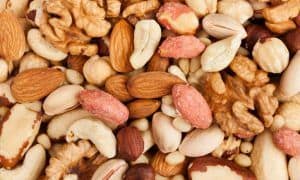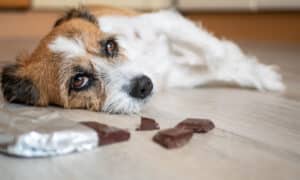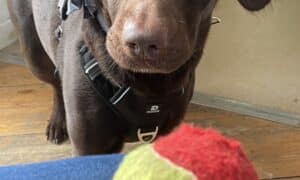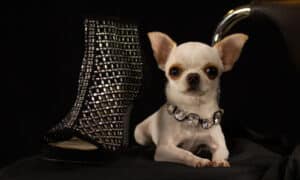“This post contains affiliate links, and I will be compensated if you make a purchase after clicking on my links.”
Is Peanut Butter for Dogs okay and safe to feed to them? (Normal peanut butter, that is — not the salmonella-contaminated brands we’ve heard so much about in the news recently, obviously!)
You are probably aware of the fact that there are several human foods that can actually be harmful or fatal to dogs and other pets. One most commonly suspected foods is peanut butter, and some owners are afraid to feed it to their dog. But in this article, we will clarify the real effects of peanut butter for dogs.
First of all, let us recap what peanut butter is. Peanut butter is a great sandwich spread for humans, which is a food paste that comes from finely ground dry roasted peanuts. The US and China are the world’s leading exporters of peanut butter, and the spread is most commonly used together in combination with other foods, such as the famous peanut butter and jelly sandwich.
There are many vitamins and minerals and other healthy compounds that are known to be present in peanut butter, such as vitamin B3, protein, magnesium, vitamin E, dietary fiber, folate, arginine and p-coumaric acid, an antioxidant.
In most recipes, peanut butter can be combined with chocolate, cheese, meat, and sauces and even made into cookies or bread.
Peanut Butter For Dogs
In the dog’s case, some dog foods may not have all the ingredients, vitamins and nutrients that are needed by his body and system to keep him healthy. But there is good news: peanut butter can supply most or all of those missing components that your dog needs. So do not fear – while many other foods out there that are fed to dogs can cause dog poisoning, kidney or liver problems, obesity and even death, peanut butter is definitely NOT one of the problem foods.
Peanut butter can be added to your regular dog food as a food supplement, because it contains Vitamin E (as mentioned above) and vitamin H (Biotin, another B vitamin). Vitamin H helps a lot in keeping your dog’s coat shiny, healthy and also helps your dog’s skin to stay healthy, just as it does in humans. It can also help in strengthening of the nails. On the other hand, Vitamin E can help your dog’s immune system, to help him fight against diseases, illnesses and sickness. As you can see, peanut butter actually has many good nutritional effects for your canine friend.
There are different kinds of peanut butter to choose from for feeding your dog. As much as possible, choose the organic and raw peanut butter, preferably those without salt, sugar or any other preservatives. This is to ensure that your dog is free of toxins and chemicals, and that the nutrients and vitamins are at maximum to benefit his system and his taste buds. It can also help prevent him from getting obese from sugar and toxins.
Shopping on the market for peanut butter-flavored treats is quite easy, as most dog treats already have peanut butter as the main flavor for your buddy to enjoy. Some vets even recommend filling rubber dog toys with peanut butter.
Dog’s absolutely love it, so don’t be afraid to use it. And here’s a great tip for using peanut butter for dogs: when you have to give your dog a pill, completely bury the pill in peanut butter. You’ll have no trouble getting him to take the pill!
Have you ever given any peanut butter to your dog? Share this article with others below.


















[…] Is Peanut Butter For Dogs Safe? […]
Grant Skewes
says:Our older dog has the early start of renal failure (as many older dogs, cats and humans have, She is on a special “renal diet” ( which can be very costly) she also has to take some pills daily for arthritis, anxiety and stomach problems. We put the pills in a small amount of peanut butter and she gobbles them down. Our Vet does not have a problem with this.
Jim D
says:You want to make sure the peanut butter has no Xylitol as that can kill them. Get organic and without salt or sugar is best and do not feed more than a tablespoon a day. There are pet foods that contain peanutbutter and dogs love it.
Jen
says:i’ve done all the research before i give my pets anything. i also ask my vet before adding, taking away or changing anything in their diets. peanut butter isnt harmful at all, you just have to monitor the amount. my vet said you can give them up to a table spoon a day (separated into smaller, one tea soon portions through out the day. ONE table spoon equals about 3 teaspoons. )
I tend to give loki (that’s my dog) a tea spoon of peanut butter between two salt-free crackers at breakfast time, again at lunch and once more before bed each night.
He’sbeen in my care for nearly a year now (he’s a rescue, we so werent sure what his breed is)
i have NOT experienced any urine crystals nor urine stones with him, as some of you have mentioned. (either you’re giving them way too much each day or you’re using the wrong brands)
and it clearly says peanut butter is to be given as a dietary supplement, meaning you cant just give them peanut butter constantly, supplements are meant to be taken in either one dose or at least three smaller doses. it’d be the same as someone taking thier weight control supplement with thier vitamin supplements at the same time and then getting sick later in the day, it just does not work. but if they take the vitamins in the morning and the weight control at lunch time, they have better results and they wont get sick. same more or less applies for dogs and peanut butter. you cant expect nothing to happen if you give them a whole jar all at once. but if you split it up into smaller portions, it doesnt only last longer but our furry friends will be just fine, and with a shiny, softer coat and wonderfully healthy skin to match as well. (how my vet explained it to me.) i have also seen a healthy increase in his energy levels and he does not itch as much as he did when i first brought him home.
all dogs are different, so please do consult your vet before doing anything. and if i do have questions myself, i’ll call my vet.
I smear some around the threads of a jar lid. It takes them longer to get it this way. Also can freeze it on jar lid to last even longer.
Not as safe as you think. … dogsnaturallymagazine.com/3-reasons-peanut-butter-isnt-safe-for-dogs-or-people/
Thanks so much Ron Miller… The article is right on. Masking medications, using as a food topper or training treat… Peanut Butter and doggies have been pals for a long time. So much so in fact, I created Puppa Nutter. Puppa Nutter is a simple ingredient peanut butter made specifically for dogs. Its a human grade peanut butter using the highest grade US grown and harvested peanuts. The only other ingredient added is flaxseed which promotes a healthy coat. We perform 3 aflatoxin tests BEFORE the product leaves the facility. We’re an SQF Quality Certified Supplier and Certified by Silliker Global Certification Services and located just north of Boston. Send me an email and I’d be happy to send you a sample. [email protected]. Thx again RonM. 🙂
Cathy
says:My vet says peanut butter is absolutely safe and I having been giving it for years. We give it to our kids. Don’t think the that guy has any credentials to say it is not. Just a helpful hint, if you put it in a kong and Freeze it, it’s much cheaper and more fun for the dogs. Bananas too!
Moronits
says:This guy is an idiot. Peanut butter contains mycotoxins.
redmane
says:You are the idiot, better to remain silent and be thought a fool than to open your mouth and remove all doubt! a dog would have to eat more than a jar a day over several years to be in danger. There are mycotoxins in a lot of food and you are thinking of aflatoxin, a natural toxin produced by certain strains of the mold. Peanuts aren’t the only affected crops. Aflatoxins have been found in pecans, pistachios and walnuts, as well as milk, grains, soybeans and spices.
“The U.S. Food and Drug Administration has regulated and enforced limits on concentrations of mycotoxins in foods and feed industries since 1985. It is through various compliance programs that the FDA monitors these industries to guarantee that mycotoxins are kept at a practical level. These compliance programs sample food products including peanuts and peanut products, tree nuts, corn and corn products, cottonseed, and milk.” Were there is an ‘agricultural food chain’ this mold could exist. Testing and retesting and knowing where the product originated, as in the country and practices used, is most helpful in deciding if its for you, or your family fur member. With regards to peanuts, they are in fact a legume, grown a in pod and part of the bean family. Same risk applies, but so do the same best practices.
Do not simply go for the striking dilemma where one thinks
that fashionable brand can”. The idea is to push the limits
of your prom wardrobe and experience innovative looks.
Finding a whopping 50% off about the true price tag or
perhaps a lot more than that on your preferred
residence digital objects is almost shut to getting that thing free of charge correct.
Carryn
says:I was told by two veterinarians that peanut butter can cause stones or crystals in dogs. Are you saying that is not true or is it in large amounts? Please let me know what you find because I have been telling people what my vet said and that they should not give peanut butter to their dags for this reason.
Thank you for your time